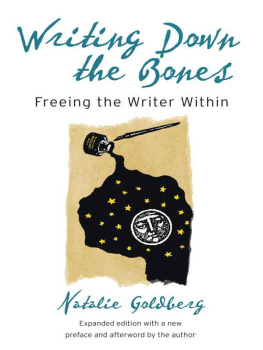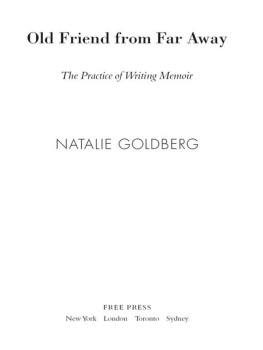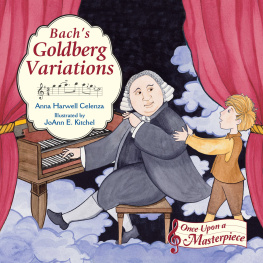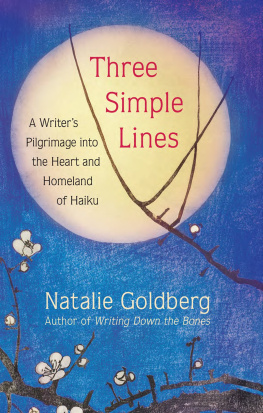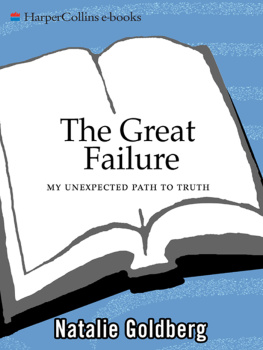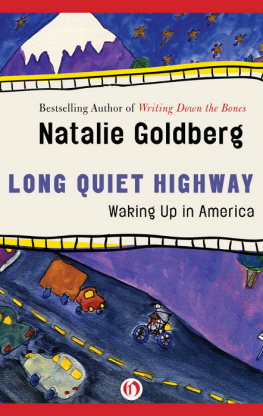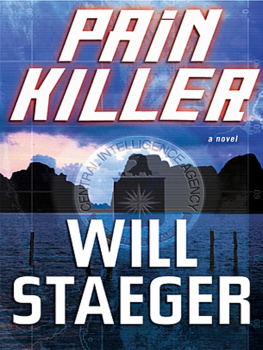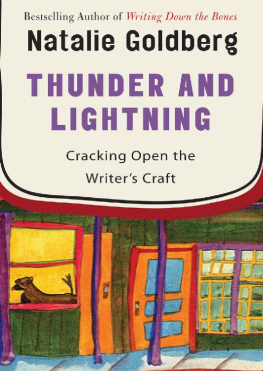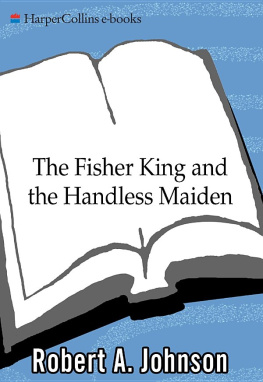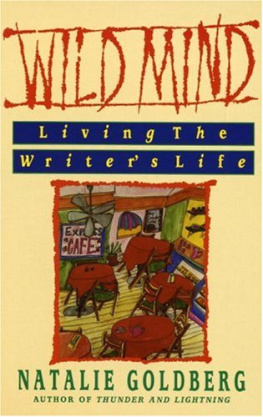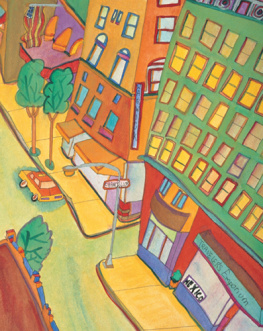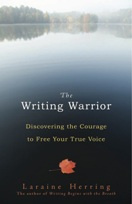Goldberg Natalie - 1986,2005,
Here you can read online Goldberg Natalie - 1986,2005, full text of the book (entire story) in english for free. Download pdf and epub, get meaning, cover and reviews about this ebook. City: Boston, year: 1986,2005,2010, publisher: Shambhala Publications, genre: Religion. Description of the work, (preface) as well as reviews are available. Best literature library LitArk.com created for fans of good reading and offers a wide selection of genres:
Romance novel
Science fiction
Adventure
Detective
Science
History
Home and family
Prose
Art
Politics
Computer
Non-fiction
Religion
Business
Children
Humor
Choose a favorite category and find really read worthwhile books. Enjoy immersion in the world of imagination, feel the emotions of the characters or learn something new for yourself, make an fascinating discovery.
- Book:1986,2005,
- Author:
- Publisher:Shambhala Publications
- Genre:
- Year:1986,2005,2010
- City:Boston
- Rating:3 / 5
- Favourites:Add to favourites
- Your mark:
- 60
- 1
- 2
- 3
- 4
- 5
1986,2005,: summary, description and annotation
We offer to read an annotation, description, summary or preface (depends on what the author of the book "1986,2005," wrote himself). If you haven't found the necessary information about the book — write in the comments, we will try to find it.
1986,2005, — read online for free the complete book (whole text) full work
Below is the text of the book, divided by pages. System saving the place of the last page read, allows you to conveniently read the book "1986,2005," online for free, without having to search again every time where you left off. Put a bookmark, and you can go to the page where you finished reading at any time.
Font size:
Interval:
Bookmark:
Writing Down
the Bones

Expanded edition with a preface
and interview with the author
N ATALIE G OLDBERG

S HAMBHALA
Boston & London
2010
Shambhala Publications, Inc.
Horticultural Hall
300 Massachusetts Avenue
Boston, Massachusetts 02115
www.shambhala.com
1986, 2005 by Natalie Goldberg
All rights reserved. No part of this book may be reproduced in any form or by any means, electronic or mechanical, including photocopying, recording, or by any information storage and retrieval system, without permission in writing from the publisher.
The Credits section constitutes a continuation of the copyright page.
The Library of Congress catalogues the trade paperback edition of this book as follows:
Goldberg, Natalie.
Writing down the bones.
1. Authorship. I. Title.
PN145.C64 1986 808.02 86-11840
eISBN 978-0-8348-2113-2
ISBN 978-0-87773-375-1
ISBN 978-1-57062-258-8
ISBN 978-1-59030-316-0
ISBN 978-1-59030-261-3
ISBN 978-1-59030-794-6
For all my students past, present, and future
May we all meet in heaven caf writing for eternity .
CONTENTS
PREFACE
A YEAR AGO on a December night in Santa Fe, New Mexico, I attended the birthday party of a young filmmaker I had known only briefly. For about half an hour I stood near the buffet table in conversation with a man in his early thirties, who I had just met. He was obviously a serious poet; I told him I was once a poet, too, before Id written my first book. We bantered back and forth. I was enjoying myself immensely.
Suddenly, with a quizzical look on his face, he asked, So, anyway, what have you written?
Well, several books, I said, but the one Im most known for is called Writing Down the Bones .
Youre kidding! His eyes bugged out. I thought you were dead.
Without blinking an eye, I responded, No, not yet. Still trucking along, still putting pen to paper.
We both laughed.
He didnt need to say any more. I understood: hed read me in high school. All books read then must be by deceased menor women. No author studied in a secondary school institution could possibly be alive.
Writing Down the Bones came out in 1986. I have often told audiences that if it had been published in the fifties it would have flopped. But instead it met this country exactly where it wasgreat hordes of Americans had a need to express themselves. Writing is egalitarian; it cuts across geographic, class, gender, and racial lines. I received fan letters from vice presidents of insurance agencies in Florida; factory workers in Nebraska; quarry workers in Missouri; prisoners in Texas; lawyers, doctors, gay rights activists, housewives, librarians, teachers, priests, politicians. A whole revolution in writing began soon after it came out. Separate writing sections in bookstores sprang up. One student said to me, I get it! Writing is the new religion.
But why, people asked me, does everybody want to write?
I dont think everyone wants to create the great American novel, but we all have a dream of telling our storiesof realizing what we think, feel, and see before we die. Writing is a path to meet ourselves and become intimate. Think about it: Ants dont do it. Trees dont. Not even thoroughbred horses, mountain elk, house cats, grass, or rocks do it. Writing is a uniquely human activity. It might even be built into our DNA. It should be put forward in the Declaration of Independence, along with the other inalienable rights: Life, liberty, and the pursuit of happinessand writing.
And its inexpensive. All you need is pen, paper (of course, computer, if you are so inclined), and the human mind. What crannies of untouched perception can you explore? What autumn was it that the moon entered your life? When was it that you picked blueberries at their quintessential moment? How long did you wait for your first true bike? Who are your angels? What are you thinking of? Not thinking of? What are you looking at? Not looking at? Writing can give you confidence, can train you to wake up.
Writing Down the Bones is backed by a two-thousand-year-old practice of studying the mind. It is not solely Natalies creative idea. I wanted to root this work, give it a solid foundation. At the time I wrote it, I had already studied meditation for ten years, six in close practice with a Japanese Zen master. Where do thoughts come from? Memories, ideas, even the word the ? Meditation and writing practice are coincident. The more we understand the human mind, our basic writing tool, the better, more secure we can be in our writing.
When this book came out, people called me a genius. I smiled, but I knew I wasnt a genius. Maybe the only genius moment was having Zen inform the writing. I had a sincere and earnest desire to figure out this writing life. I very badly wanted to do it and I didnt know how, and I hadnt learned how in all my public school education. By college, I think I gave up. But I had a yearning for it way deep underneath, a desire I didnt even know I had. I was in love with reading and literature. There were stories only I knew about my family, about my first kiss, last haircut, the smell of sage on a mesa and my kinship with the flat plains of Nebraska. I had to get slow and dumb (not take anything for granted) and watch and see how everything connects, how you contact your thoughts and lay them down on paper.
I wish now that I had another chance to write that school composition, What I Did Last Summer. When I wrote it in fifth grade, I was scared and just recorded: It was interesting. It was nice. My summer was fun. I snuck through with a B grade. But I still wondered, How do you really do that? Now it is obvious. You tell the truth and you depict it in detail: My mother dyed her hair red and polished her toenails silver. I was mad for Parcheesi and running in the sprinkler, catching beetles in a mason jar and feeding them grass. My father sat at the kitchen table a lot staring straight ahead, never talking, a Budweiser in his hand.
What an opportunity to recount the crush I had on a blond boy down the block, the news of racial injustice I saw on TV and how I felt confused and hurt by it, how I feared my sister was prettier than me, how I made coleslaw with my grandma. But I didnt know how to narrate all these things.
In this book, I instruct all of us howthe old students, and the young.
It is my sincere wish that this book be taught in all public and private schools, that students learn how to do writing practice, that they come to know themselves, feel joy in expression, trust what they think. Once you connect with your mind, you are who you are and youre free.
A long time ago I read Jack Kerouacs essentials for prose. Four of them, in particular, have provided me with heart for the path:
Accept loss forever
Be submissive to everything, open, listening
No fear or shame in the dignity of your experience, language, and knowledge
Be in love with your life
Believe me, you, too, can find your place inside the huge terrain of writing. No one is so odd as to be left out.
Now, please, go. Write your asses off.
D ECEMBER 2004
Introduction
I WAS A G OODY T WO- S HOES all through school. I wanted my teachers to like me. I learned commas, colons, semicolons. I wrote compositions with clear sentences that were dull and boring. Nowhere was there an original thought or genuine feeling. I was eager to give the teachers what I thought they wanted.
In college I was in love with literature. I mean wild about it. I typed poems by Gerard Manley Hopkins over and over again so I could memorize them. I read John Milton, Shelley, Keats aloud and then swooned on my narrow bed in the dormitory. In college in the late sixties, I read almost exclusively male writers, usually dead, from England and the rest of Europe. They were very far removed from my daily life, and though I loved them, none of them reflected my experience. I must have subconsciously surmised that writing was not within my ken. It never occurred to me to write, though I secretly wanted to marry a poet.
Next pageFont size:
Interval:
Bookmark:
Similar books «1986,2005,»
Look at similar books to 1986,2005,. We have selected literature similar in name and meaning in the hope of providing readers with more options to find new, interesting, not yet read works.
Discussion, reviews of the book 1986,2005, and just readers' own opinions. Leave your comments, write what you think about the work, its meaning or the main characters. Specify what exactly you liked and what you didn't like, and why you think so.

